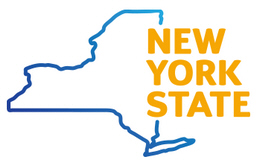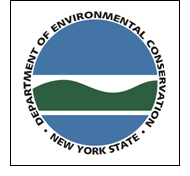
|
|
DEC
Announces $3.5 Million in Grants Awarded in 2017
|
|
to
Increase Donation of Wholesome Food and
|
|
Divert
Food Scraps from Landfills
|
|
|
|
|
Food Donation
and Food Waste Recycling Support Governor Cuomo’s
|
|
Goal to
Reduce Greenhouse Gas Emissions 40 Percent by 2030
|
|
Albany,
NY – January 2018 / Newsmaker Alert / New
York State Department of Environmental Conservation (DEC) Commissioner
Basil Seggos announced Friday (January 12) that in 2017 DEC awarded $3.5
million to support the donation of wholesome food and municipal organics
recycling projects across the state through the Environmental Protection
Fund’s Municipal Recycling and Climate Smart Communities grant programs.
Directed by Governor Andrew M. Cuomo, New York is making significant investments
to encourage donation of food and recycling of food waste, resulting in
less waste directed to landfills and reducing greenhouse gas emissions.
|
 “Through
Governor Cuomo’s leadership, New York is becoming a national leader in
pioneering a variety of investments and initiatives to encourage wholesome
food donation and food waste recycling,” said Commissioner Seggos. “Diverting
food and food waste from landfills stands to benefit all New Yorkers by
putting good, wholesome food to use at area food banks, reducing the greenhouse
gas emissions that contribute to climate change, and saving resources.
New York State is making significant investments in the capability to donate
food and municipal organics recycling infrastructure across the state,
facilitating increased food donation to food banks, and providing funds
for larger generators of food scraps to divert material from landfills.” “Through
Governor Cuomo’s leadership, New York is becoming a national leader in
pioneering a variety of investments and initiatives to encourage wholesome
food donation and food waste recycling,” said Commissioner Seggos. “Diverting
food and food waste from landfills stands to benefit all New Yorkers by
putting good, wholesome food to use at area food banks, reducing the greenhouse
gas emissions that contribute to climate change, and saving resources.
New York State is making significant investments in the capability to donate
food and municipal organics recycling infrastructure across the state,
facilitating increased food donation to food banks, and providing funds
for larger generators of food scraps to divert material from landfills.”
DEC
estimates that 40 percent of food in the U.S. goes uneaten-that’s more
than 20 pounds of food per person per month. In addition to the water and
nutrients that are used to produce food that is simply thrown away, wasted
wholesome food represents a lost opportunity to feed the estimated 14 percent
of New Yorkers that are food insecure, and wasting food waste eliminates
the potential to convert this material into energy or useful soil products
through composting and anaerobic digestion.
In
late 2017, DEC awarded $800,000 to the Food Bank Association of New York
State to help increase food donation. In addition, grants totaling $1.2
million were awarded to municipalities in 2017 and January of 2018 to support
food donation and food waste recycling:
-
$420,490
to the Onondaga County Resource Recovery Agency to support food scraps
composting by purchasing a grinder for bulking material, skid steer, and
temperature monitoring system.
-
$205,500
to the Rockland County Solid Waste Management Authority to fund three food
distribution centers to distribute fresh produce and non-perishable items
to smaller community food pantries. Purchases will include refrigerated
trucks, walk-in coolers/freezers, small refrigerator/freezers, and shelving
for food storage.
-
$138,615
to the town of Bethlehem to expand its food scraps composting operation
by purchasing a compost screener and aeration equipment.
-
$100,000
to the town of Bethlehem to pave a portion of the compost facility and
improve operation of aerated static pile food scraps composting project.
-
$33,350
to the town of Brookhaven’s “Brew to Moo” project that will increase the
town’s efficiency to pick up spent brewery grains and bring these materials
to area ranches and farms for animal feed. The town will purchase a rack
dump truck and heavy duty containers with lids for on-site storage and
transport of the spent brewery waste.
-
$25,637
to the Westchester County Department of Environmental Facilities to purchase
rocket in-vessel composting unit to process food scraps generated by a
community college, medical center, and regional food bank.
-
$276,407
to Oneida-Herkimer Solid Waste Authority to support the anaerobic digestion
of food scraps to generate energy.
In addition,
DEC’s Climate Smart Communities Grants Program supports the reduction and
recycling of food waste by local governments. In 2017, DEC awarded nearly
$1.5 million in grants to reduce greenhouse gas emissions through support
for organics recycling and food recovery:
-
$30,000
to the town of Greenburgh, in partnership with the Greenburgh Nature Center,
to develop and implement a town-wide food scrap recycling campaign and
establish two municipal food scrap drop-off sites.
-
$62,960
to the city of Kingston, which will partner with the Hudson Valley Regional
Council to develop an Organics Diversion Plan that will include five Climate
Smart Community Certification actions: 1. waste management strategy for
government hosted/permitted events; 2. organics collection and composting
in government buildings; 3. government waste audit and diversion tracking;
4. compost bin distribution plan; and 5. determine the feasibility of an
organics collection program (residential and commercial).
-
$17,190
to the town of New Paltz, in partnership with Rescuing Leftover Cuisine,
to continue efforts to build a Food Recovery Infrastructure program to
increase the amount perishable food donated to local pantries. The purchase
and installation of two insulated Cool Bot® refrigerated sheds will
allow large quantities of perishable donations to be stored for several
days until distribution.
-
$77,500
to the Sullivan County’s Division of Public Works/Solid Waste Management
to hire a consulting engineering firm to conduct an organic composting
feasibility study with preliminary siting and conceptual design. The resulting
Organics Management Plan (OMP) will outline the best method and means for
the County to implement organics waste management, and will also be a component
of the County’s required Solid Waste Management Plan.
-
$1,300,000
to Onondaga County, which through its Onondaga County Water Environment
Protection will construct improvements at the Metropolitan Waste Water
Treatment Plant in Syracuse on the eastern shore of Onondaga Lake that
will allow the plant to utilize the methane gas produced as a result of
accepting food waste into its digestion system.
New York’s
supermarkets, restaurants, colleges, hospitals, and other large food scrap
producers generate more than 210,000 tons of wasted food and food scraps
each year, much of which is edible. If just five percent of this material
is donated, food banks would see an increase of 20 percent in the amount
of food available for consumption. And if these food scraps were diverted
from landfills, New York could reduce greenhouse gas emissions by more
than 120,000 metric tons. This is the equivalent of taking 37,000 cars
off the road each year, according to the New
York State Energy Research and Development Authority (NYSERDA).
New
York’s large food scraps producers also stand to gain from diverting wasted
food from landfills. A 2017
NYSERDA report (link leaves DEC website) found that collectively these
institutions could reduce costs by up to $12 million per year by recovering
and recycling food waste.
To
encourage food waste recycling, the 2017-18 State Budget included $2 million
to support food donation and recycling projects. In addition, the Empire
State Development Corporation provided $2 million in grants to expand cold
storage capacity at food banks, as well as $4 million in grants over three
years to large generators to implement recommendations from waste audits,
purchase storage bins and coolers for food donation, and improve and expand
on-site compost facilities.
The
NYSERDA report estimates the current cost associated with hauling, tipping
(dumping), greenhouse gases and the damages from disposing of food wastes
from large producers is approximately $41 million annually. If the use
of food waste recycling facilities is expanded throughout the state, it
could reduce those costs by $15 million to $22 million a year. According
to the report, large food waste generators could save $3 million on hauling
and $5.3-$9.9 million on tipping costs, for a total of $8.3 - $12.9 million
in savings.
Senator
Tom O’Mara, Chair of the Senate Environmental Conservation, said, “We need
to keep encouraging and taking these commonsense actions to stop perfectly
good, fresh, nutritious food from ending up in landfills and waste incinerators
and, at the same time, to help combat hunger.”
“It
is well documented that there is an unnecessary amount of food waste generated
overall and these grants are a great way for New York to step up and address
that issue while also benefiting the greater good. We need to constantly
be thinking of ways to mitigate climate change and reduce harmful emissions
from a multi-pronged approach, and this is one example of that. By diverting
wholesome food from the landfills, we are reducing greenhouse gas emissions
and benefitting the environment, while at the same time ensuring that food
finds its way to those in need. I applaud the Governor for utilizing these
funds in a way that will benefit all New Yorkers,” said Assemblyman Steve
Englebright, Chair of the Assembly Committee on Environmental Conservation.
“Our
membership is currently working with donors who donate good and wholesome
food from their businesses to feed the hungry in NYS. We have established
processes and systems in place to make sure the right food is donated,
safely handled and then distributed. These funds will further open the
door for food banks to receive food and distribute it, through a network
of 2,500 food pantries and 2,500 institutions in NYS. Food Banks rely on
charitable donations to feed those who are not eligible for nutrition assistance,
and this is a smart way to increase supply,” said Anita M. Paley, Executive
Director, Food Bank Association of New York State.
“We
very much appreciate the grant money awarded by the NYS Department of Environmental
Conservation. These funds will be utilized to continue our ongoing efforts
to divert recoverable organic food waste from our regional landfill conserving
landfill space while at the same time generating green energy,” said William
A. Rabbia, Executive Director of the Oneida-Herkimer Solid Waste Authority.
Source
Document
Media
Contact:
Press
Office - Erica Ringewald
625
Broadway
Albany,
NY 12233-1016
518-402-8000 |




